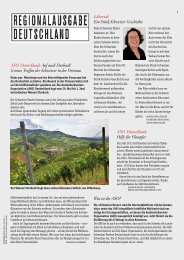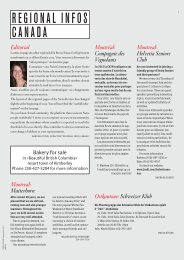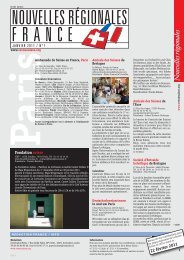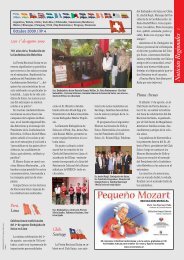Download PDF Swiss Review 6/2012 Low ... - Schweizer Revue
Download PDF Swiss Review 6/2012 Low ... - Schweizer Revue
Download PDF Swiss Review 6/2012 Low ... - Schweizer Revue
You also want an ePaper? Increase the reach of your titles
YUMPU automatically turns print PDFs into web optimized ePapers that Google loves.
SWISS REVIEW December <strong>2012</strong> / No. 6<br />
12 FOCUS<br />
thundered into the valley on each occasion,<br />
were primarily a result of retreating permafrost.<br />
Return of the summer retreat<br />
The mountains will nevertheless remain important.<br />
Researchers are expecting what the<br />
tourism industry is hoping for – greater demand<br />
for holidays in the mountains as a result<br />
of sharp temperature rises in the Mediterranean<br />
and searing heat in the cities of<br />
Switzerland’s Central Plateau. The antiquated<br />
term “summer retreat” may enjoy a<br />
renaissance. The relative coolness of regions<br />
at higher altitude will become an asset.<br />
However, anyone hiking through the Alps<br />
in future will have to become accustomed<br />
to new surroundings. The Federal Office for<br />
the Environment expects that 500 to 600<br />
new mountain lakes with a total area of 60<br />
square kilometres will be created as a result<br />
of glacial melting.<br />
The debate goes on<br />
Elsewhere, rising sea levels are threatening<br />
inhabited areas. Switzerland does not have<br />
to prepare itself for this kind of acute threat.<br />
The Zurich-based geologist and National<br />
Councillor Kathy Riklin (CVP) puts it quite<br />
plainly: “We will survive this but at a high<br />
cost.” Riklin, who also chairs the OcCC, is<br />
concerned at the growing number of people<br />
“who deny the truth of climate change”.<br />
While many people are aware just how serious<br />
the situation is, if the “minority of sceptics”<br />
gain a foothold the mood may swing in<br />
the other direction and Switzerland’s “wellplanned<br />
climate roadmap” could be jeopardised.<br />
Apathy towards important issues is<br />
nonetheless not a new phenomenon. Riklin<br />
remarks: “Issues continually arise that are<br />
critical to survival and yet people appear indifferent.”<br />
Patrick Hofstetter, head of the climate<br />
and energy department at WWF Switzerland,<br />
has no time for “climate sceptics”. He<br />
believes denial of climate change is unquestionably<br />
misguided as there is nothing to<br />
suggest that Switzerland will be spared:<br />
“Climate change measurements confirm the<br />
forecasts.” Temperatures in Switzerland are<br />
actually rising at twice the rate of the global<br />
average. It is therefore vital “that Switzerland<br />
relentlessly pursues the global objective<br />
of restricting the increase in temperatures<br />
to less than 2°C by 2050”. If a greater increase<br />
is permitted, “then it is highly likely<br />
to get very, very hot”. In the event of temperature<br />
rises of over 2°C, there is a risk that<br />
the system will topple due to self-perpetuating<br />
effects. Hofstetter believes this would<br />
result in even more rapid climate change<br />
that could no longer be contained by man, a<br />
conviction shared by Kathy Riklin.<br />
Hofstetter provides an example of a selfperpetuating<br />
effect: “Permafrost soils contain<br />
lots of methane. If they thaw, this aggressive<br />
greenhouse gas will be released,<br />
causing temperatures to rise exponentially.”<br />
Pro Natura expert Urs Tester points to similar<br />
chain reactions. If the fens should disappear<br />
as a result of climate change, the process<br />
would also be intensified: “Fens store<br />
more CO2 than all the forests worldwide. If<br />
fens are destroyed, they lose their storage<br />
capacity and large quantities of environmentally<br />
harmful CO2 are released. Protecting<br />
the fens therefore helps protect the environment.”<br />
A few killer arguments<br />
If Hofstetter, Tester and Riklin were to sit<br />
around a table with Hans Killer, the debate<br />
would unquestionably get heated. Hans<br />
Killer, a National Councillor in Aargau and<br />
one of the spokespersons for the <strong>Swiss</strong> People’s<br />
Party (SVP) on climate policy is firmly<br />
opposed to Switzerland pursuing any “special<br />
course of action with climate policy”. He<br />
believes climate change can only be curbed<br />
in conjunction with the rest of the world: “It<br />
makes no sense for Switzerland to proceed<br />
with drastic measures.” It will only end up<br />
being disadvantaged: “It would be ridiculous<br />
to react too frantically as Switzerland is far<br />
from one of the biggest emitters of CO2.”<br />
Killer’s arguments, as he concedes, are fed<br />
by “a certain scepticism towards science”.<br />
He nevertheless sees that the disappearance<br />
of the glaciers and the rising zero-degree<br />
line would impact on winter tourism: “Climate<br />
change presents a real challenge for<br />
winter sports resorts.” Aside from that the<br />
issue should be tackled with much more<br />
composure and “without hysterically going<br />
it alone”, he says. “Slightly higher temperatures<br />
in the <strong>Swiss</strong> Central Plateau will not<br />
pose major problems.”<br />
Scientist Riklin disputes science-sceptic<br />
Killer’s argument that Switzerland will<br />
not help to save the world’s climate by<br />
leading the way: “Switzerland has a special<br />
social responsibility. We are privileged<br />
to be able to set a good example. If<br />
we lead the way, we will inspire other<br />
much larger industrial nations to follow<br />
suit.” Pursuing a consistent strategy with<br />
climate policy remains “absolutely crucial”<br />
for Switzerland.<br />
Criticism of the CO 2 law<br />
Killer’s SVP and many environmental protection<br />
campaigners do agree on one point –<br />
they deem the <strong>Swiss</strong> CO2 law (see box) to<br />
be “unsatisfactory”. Nonetheless, the reasons<br />
for this poor opinion differ. Hans Killer<br />
says that passing a CO2 law and showing<br />
how important the reduction of CO2 emission<br />
is while “in the same breath” giving the<br />
go-ahead for new gas-fired power plants is<br />
“completely inconsistent”. The planned gasfired<br />
power station in Chavalon will “wipe<br />
out all the CO2 savings achieved on the<br />
roads thanks to tighter provisions and technical<br />
progress”. The fact that the Chavalon<br />
operators want to invest in CO2-reduction<br />
projects abroad is irrelevant in Killer’s view:<br />
“That’s nothing but a form of indulgence<br />
trade. I’m not interested in the redevelopment<br />
of some chicken farm in Southeast<br />
Asia.” It should be noted that Killer sees nuclear<br />
power as one of the viable, eco-friendly<br />
energy sources of the future.<br />
WWF representative Hofstetter adjudges<br />
federal government and, in particular, the<br />
Federal Council to be “unsatisfactory” because<br />
while it is pursuing the right objectives<br />
and relying on correct analyses it is “dragging<br />
its heels over its commitment”. The <strong>Swiss</strong><br />
CO2 law, which is “targeting modest objectives”,<br />
will “in effect be undermined” by poor<br />
implementation. Hofstetter believes there is<br />
no question that CO2 emissions have to be<br />
cut: the high consumption of (fossil) fuels is<br />
one of the main reasons for climate change.<br />
The curve is particularly steep in Switzerland<br />
where energy consumption increased eightfold<br />
in the 20th century.<br />
Between “knowing” and “doing”<br />
In Switzerland, general sensitivity about the<br />
future of the climate is not just determined<br />
by scientific model projections. Various uncomfortable<br />
issues are also significant:<br />
– What consequences will the enormous<br />
financial expenditure on the management of<br />
climate change have on national co-existence?<br />
– What conflicts will arise if this expenditure<br />
results in the sacrifice of services that<br />
citizens take for granted today?

















